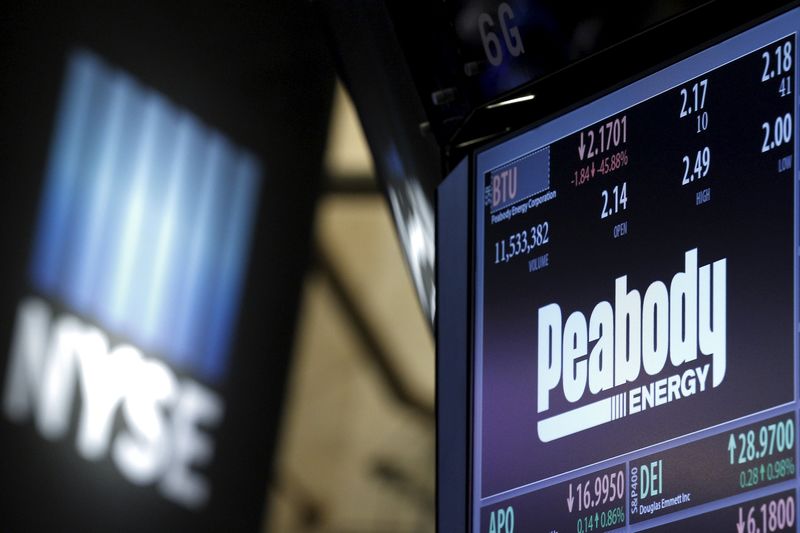By Tracy Rucinski and Tom Hals
(Reuters) - Peabody Energy Corp (N:BTU) filed for U.S. bankruptcy protection on Wednesday after a sharp drop in coal prices left it unable to service debt of $10.1 billion (£7.1 billion), much of it incurred for an expansion into Australia.
The Chapter 11 bankruptcy filing from Peabody, the world's biggest private-sector coal producer, ranks among the largest in the commodities sector since energy and metal prices began to fall in mid-2014 as once fast-growing markets such as China and Brazil started to slow.
Unlike most large corporate bankruptcies, Peabody's filing did not sketch out a plan for cutting debt, although it said it expected its mines to continue to operate as usual.
Peabody estimated its assets at $11.0 billion and liabilities at $10.1 billion as of the end of 2015, according to court documents.
The St. Louis-based company said its planned sale of mines in New Mexico and Colorado had fallen through and that its Australian operations were excluded from the bankruptcy filing.
Peabody has secured $800 million in debtor-in-possession financing from both secured and unsecured creditors, including a $500 million term loan, $200 million bonding accommodation facility and a letter of credit worth $100 million, it said.
"This process enables us to strengthen liquidity and reduce debt, build upon the significant operational achievements we've made in recent years and lay the foundation for long-term stability and success in the future," Peabody Chief Executive Officer Glenn Kellow said in a statement.
Shares of Peabody, which closed at $2.07 on Tuesday, were halted on Wednesday.
Debt troubles for Peabody date back to its $5.1 billion leveraged buyout of Macarthur Coal in 2011, just when prices peaked for the metallurgical coal that the Australian company supplies to Asian steel mills.
As demand for metallurgical coal fell, particularly in China, Peabody's financial woes intensified. The company took a $700 million writedown on its Australian metallurgical coal assets last year.
At home, the U.S. shale boom of the past few years made natural gas competitive with thermal coal, and the Obama administration's environmental regulations raised operational costs.
"2016 will probably go down as the worst year in history for U.S. coal," JPMorgan (NYSE:JPM) said in an analyst note to clients on Tuesday. U.S. production declined 31 percent in the first quarter from a year earlier, although stockpiles still remain high, the note said.
Producers accounting for about 45 percent of U.S. coal output have filed for bankruptcy in the current industry downturn, based on 2014 government figures.
Peabody reached an agreement with New York Attorney General Eric Schneiderman in November to amend its disclosures to warn investors that concerns about the environmental impact of coal consumption could have a significant impact on demand for its products.
While coal use has stalled globally, largely because of China's economic slowdown and efforts to protect domestic miners and rein in rampant pollution, most analysts expect consumption to remain stable or rise in the future.
Some 500 coal-fired power stations are under construction. Eighty percent of them are in the Asia-Pacific region, where consumption is still growing in emerging markets as well as developed economies such as Japan and South Korea.

The case is in the U.S. Bankruptcy Court for the Eastern District of Missouri, St. Louis, case number 16-42529.